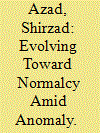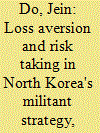| Srl | Item |
| 1 |
ID:
160672


|
|
|
|
|
| Summary/Abstract |
North Korea's engagement in the Middle East is a six-decade long narrative. Neither the DPRK nor its Middle Eastern partners have remained still over this time; each region has undergone significant changes. In particular, the leadership of the North Korea is now in the hands of the third generation. No matter how stagnant and monolithic the country may seem at first sight, each generation has had to deal with differing commitments and adapt to changing realities. As such, each generational change of leadership in Pyongyang has arguably had repercussions on the DPRK's relationship Middle Eastern partners, which may at times have been misattributed to a fundamental change of approach. This study attempts, therefore, to probe the twists and turns in the DPRK's interactions with the Middle East since the death of Kim Il-sung, beginning with an appraisal of each leaderships’ priorities in North Korea, and how they could potentially influence Pyongyang's overall orientation toward its different partners in the region.
|
|
|
|
|
|
|
|
|
|
|
|
|
|
|
|
| 2 |
ID:
184102


|
|
|
|
|
| Summary/Abstract |
This paper examines the Kim Il-sung discourse [hereafter Kim discourse] as a modern myth formed in the 20th century; it investigates what makes the Kim discourse a modern myth and considers the myth's characteristics. The Kim discourse is frequently regarded as a myth; however, why it should be considered a myth in the strict literary meaning has been scarcely studied.
|
|
|
|
|
|
|
|
|
|
|
|
|
|
|
|
| 3 |
ID:
147342


|
|
|
|
|
| Summary/Abstract |
Studies of North Korean foreign policy are increasingly turning to the thesis advanced by prospect theory of loss aversion and reference dependence to explain its risk taking. Most of these studies focus on the post-1990s as the genesis of North Korea's risk-prone behavior. I show that Pyongyang has operated from a frame of losses since the late 1960s, due to the parallel decline of ideological unity in Soviet–North Korean and Sino–North Korean relations. In particular, from 1967 to 1968, North Korea perceived both allies to be more focused on countering each other than on jointly opposing the United States. Consequently, Pyongyang for the first time saw both Moscow and Beijing as doubtful assets in its bid for hegemonic unification. North Korea therefore stressed the role of small countries in the revolutionary struggle and launched the most violent phase of its militant strategy, emphasizing the US threat as the common enemy. The strategy was therefore in part a function of fear rather than a desire for expansion.
|
|
|
|
|
|
|
|
|
|
|
|
|
|
|
|
| 4 |
ID:
183410


|
|
|
|
|
| Summary/Abstract |
This paper studies North Korea’s official narrative on the Second World War.
The country is extremely autocratic, meaning that the only allowed vision
is the one prescribed by the state. This vision was initially imprinted by
the Soviet Union in the late 1940s. However, the official narrative on the
Soviet-Japanese War, which led to the establishment of the North Korean
state, has been rewritten: today Pyongyang credits Japan’s defeat to Kim
Il-sung and his “Korean People’s Revolutionary Army”—an organization
which never existed in reality. This article traces the evolution of the North
Korean false narrative and concludes that each of its pages was farther away
from historical truth than the previous one.
|
|
|
|
|
|
|
|
|
|
|
|
|
|
|
|
| 5 |
ID:
164692


|
|
|
|
|
| Summary/Abstract |
This article examines the content of North Korea's juche ideology by analyzing official texts in comparison with Confucian classics and new religious movements in South Korea. The comparison revealed a series of similarities that vividly demonstrate that juche ideas have absorbed core elements of Korean and East Asian philosophical traditions.
|
|
|
|
|
|
|
|
|
|
|
|
|
|
|
|
| 6 |
ID:
184761


|
|
|
|
|
| Summary/Abstract |
North Korea is widely seen as having among the most corrupt governments in the world. However, the Kim family regime has not always been so accepting of government wrongdoing. Drawing on archival evidence, this study shows that Kim Il-sung saw corruption as a threat to economic development and launched campaigns to curb it throughout the 1950s. I find that these campaigns were at least somewhat successful, and they contributed to post-Korean War reconstruction and rapid development afterwards. So when and why did the regime shift from combating corruption to embracing it? I argue that changes in the country's economic system following the crisis of the 1990s, especially de facto marketization, made corruption more beneficial to the regime both as a source of revenue and as an escape valve for public discontent. This study's findings contribute to our understanding of the politics of corruption control in authoritarian regimes.
|
|
|
|
|
|
|
|
|
|
|
|
|
|
|
|